#Rabshakeh
Text

Isaiah 37:4 (NKJV) -
It may be that the LORD your God will hear the words of the Rabshakeh, whom his master the king of Assyria has sent to reproach the living God, and will rebuke the words which the LORD your God has heard. Therefore lift up your prayer for the remnant that is left.’ ”
25 notes
·
View notes
Text
173 Hezekiah and Josiah. Similarities & Differences.
Hezekiah and Josiah were two of the greatest Hebrew kings on the Davidic tree. As Hezekiah was Josiah’s Great Grandfather, they never met. It may seem logical to suggest that Josiah would have been brought up being taught of the legendary Godliness of Hezekiah, however it has to be added that Josiah’s father – and especially his grandfather were godless idolaters. Josiah’s family nights around…

View On WordPress
#Battle of Carchemish#Bible#Fall of Samaria#God#Hebrew#Israel#Jerusalem#Judah#Old Testament#Pharaoh Necho#Rabshakeh#Sennacharib#Shalmaneser#Yahweh
1 note
·
View note
Note
Piss in mentioned in the bible?????
Yes it is!!
2 Kings 18:27
But Rabshakeh said unto them, Hath my master sent me to thy master, and to thee, to speak these words? hath he not sent me to the men which sit on the wall, that they may eat their own dung, and drink their own piss with you?
I was surprised too, trust me
#how many of these words were in the bible#were these words in the bible#hmotwwitb#the asks of fritz
64 notes
·
View notes
Text
making this post before i get this question: yes piss is in the bible. 2 kings 18:27 "But Rabshakeh said unto them, Hath my master sent me to thy master, and to thee, to speak these words? hath he not sent me to the men which sit on the wall, that they may eat their own dung, and drink their own piss with you?"
33 notes
·
View notes
Text
The Lachish Reliefs
The Lachish reliefs are a set of Assyrian palace reliefs narrating the story of the Assyrian victory over the kingdom of Judah during the siege of Lachish in 701 BCE and carved between 700 and 681 BCE, as a decoration of the South-West Palace of Sennacherib in Nineveh, or modern Iraq.
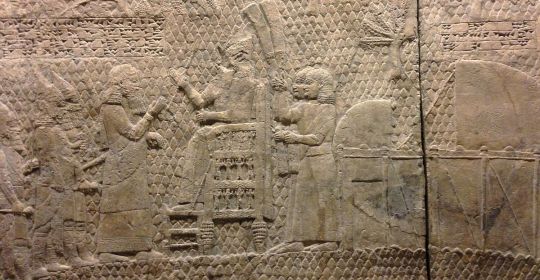
The reliefs were discovered in 1845–1847 fully covering the walls of the palace at 12 metres (39 ft) wide and 5.10 metres (16.7 ft) long.
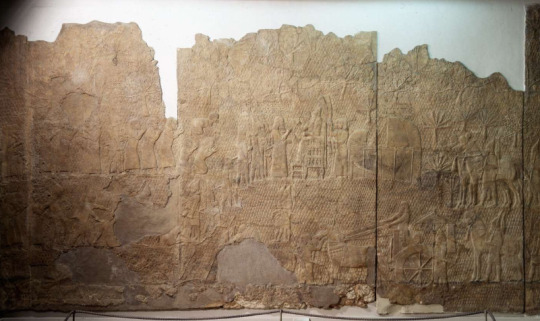
This battle is attested to many times within the Hebrew Old Testament, in Isaiah 36:1-2: "In the fourteenth year of King Hezekiah, King Sennacherib of Assyria came up against all the fortified cities of Judah and captured them. The king of Assyria sent the Rabshakeh from Lachish to King Hezekiah at Jerusalem, with a great army. He stood by the conduit of the upper pool on the highway to the Fuller’s Field." (NRSV) and in 2 Chronicles 32:9: "After this, while King Sennacherib of Assyria was at Lachish with all his forces, he sent his servants to Jerusalem to King Hezekiah of Judah and to all the people of Judah that were in Jerusalem..." (NRSV).
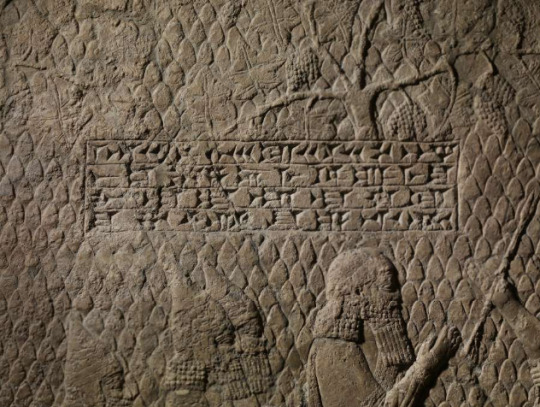
7 notes
·
View notes
Text
How Leaders Should Pray
When the message from Rabshekeh reaches Hezekiah about Sennecarib's insulting taunt, we find the king's response incredibly specific. He seeks God. But he teaches us how leaders should do so.
Isaiah 37:1–4 (ESV) As soon as King Hezekiah heard it, he tore his clothes and covered himself with sackcloth and went into the house of the LORD. 2 And he sent Eliakim, who was over the household, and Shebna the secretary, and the senior priests, covered with sackcloth, to the prophet Isaiah the son of Amoz. 3 They said to him, “Thus says Hezekiah, ‘This day is a day of distress, of rebuke, and of disgrace; children have come to the point of birth, and there is no strength to bring them forth. 4 It may be that the LORD your God will hear the words of the Rabshakeh, whom his master the king of Assyria has sent to mock the living God, and will rebuke the words that the LORD your God has heard; therefore lift up your prayer for the remnant that is left.’ ”
He sends a message to Isaiah the prophet. That's where you go when you need direction. To the Word of God through his prophets. Today we have the Bible for that very purpose - to give us help in our time of need.
He is also honest with the situation. Hezekiah does not put on a showy pretense of vain religion. He knows it's a bad time. He uses the analogy of a woman unable to deliver a child. What does that show you about Hezekiah's view of the situation? It shows you he knows there's hope but he does not have what it takes to bring it about. He knows there's a child to be born but he is unable to deliver it. That's prayer. We know there's an answer but we can do nothing to make it happen. We are totally dependent on God.
He defines the feeling he has about what's going on and he appeals to Isaiah to intervene. It's interesting because his speaking to Isaiah exposes our inward need to have a mediator in times of difficulty between us and the Lord.
Isaiah delivers the Lord's response:
Isaiah 37:6–7 (ESV) Isaiah said to them, “Say to your master, ‘Thus says the LORD: Do not be afraid because of the words that you have heard, with which the young men of the king of Assyria have reviled me. 7 Behold, I will put a spirit in him, so that he shall hear a rumor and return to his own land, and I will make him fall by the sword in his own land.’ ”
And so it comes to pass. Sennacherib does hear of an invasion from Cush and sets out to fight against them. But as he goes he sends more intimidating words to Hezekiah through his messengers. And I love what Hezekiah does then.
Isaiah 37:14 (ESV) Hezekiah received the letter from the hand of the messengers, and read it; and Hezekiah went up to the house of the LORD, and spread it before the LORD.
He showed God what was written about him and against him. He laid it out. Good prayer does that. We don't hide, we are honest about our problems, both inwardly and externally. We don't have to pretend we are full of faith when we are not. We can show God what is bothering us, even if they are the lies of our enemies.
Then the final act of prayer from Hezekiah shows the kind of faith we need when we approach the Lord.
Isaiah 37:15–20 (ESV) And Hezekiah prayed to the LORD: 16 “O LORD of hosts, God of Israel, enthroned above the cherubim, you are the God, you alone, of all the kingdoms of the earth; you have made heaven and earth. 17 Incline your ear, O LORD, and hear; open your eyes, O LORD, and see; and hear all the words of Sennacherib, which he has sent to mock the living God. 18 Truly, O LORD, the kings of Assyria have laid waste all the nations and their lands, 19 and have cast their gods into the fire. For they were no gods, but the work of men’s hands, wood and stone. Therefore they were destroyed. 20 So now, O LORD our God, save us from his hand, that all the kingdoms of the earth may know that you alone are the LORD.”
He acknowledges that God is over the nations and lands. He knows their gods are nothing but the work of men's hands. He prays for deliverance from the oppression of his enemy and he prays for this deliverance with the ultimate aim that "all the kingdoms of earth may know HE alone is the LORD!"
That's how leaders should pray. They need to center the purpose of their request on the glorification of God among the people. God help us, so that the world may know there is no help outside of you.
from Blogger https://ift.tt/8qAjSMI
via IFTTT
4 notes
·
View notes
Text
Hezekiah Destroys Idolatry in Judah
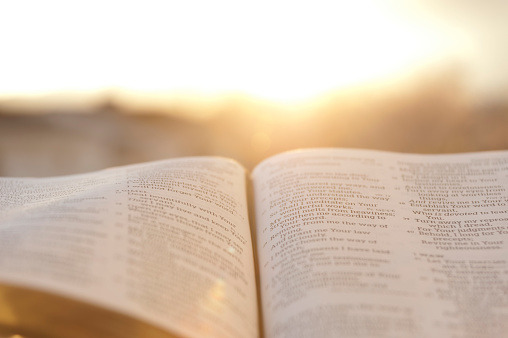
1 Now in the third year of Hoshea, son of Elah king of Israel, Hezekiah the son of Ahaz king of Judah began to reign.
2 He was five and twenty years old when he began to reign, and reigned nine and twenty years in Jerusalem. His mother’s name also was Abi the daughter of Zechariah,
3 And he did uprightly in the sight of the Lord, according to all that David his father had done.
4 He took away the high places, and brake the images, and cut down the groves, and brake in pieces the brazen serpent that Moses had made: for unto those days the children of Israel did burn incense to it, and he called it Nehushtan.
5 He trusted in the Lord God of Israel: so that after him was none like him among all the kings of Judah, neither were there any such before him.
6 For he clave to the Lord and departed not from him, but kept his commandments, which the Lord had commanded Moses.
7 So the Lord was with him, and he prospered in all things which he took in hand, also he rebelled against the king of Assyria, and served him not.
8 He smote the Philistines unto Gaza, and the coasts thereof, from the watchtower unto the defensed city.
9 ¶ And in the fourth year of King Hezekiah, (which was the seventh year of Hoshea son of Elah king of Israel) Shalmaneser king of Assyria came up against Samaria, and besieged it.
10 And after three years they took it, even in the sixth year of Hezekiah: that is, the ninth year of Hoshea king of Israel was Samaria taken.
11 Then the king of Assyria did carry away Israel unto Assyria, and put them in Halah and in Habor, by the river of Gozan, and in the cities of the Medes,
12 Because they would not obey the voice of the Lord their God, but transgressed his covenant: that is, all that Moses the servant of the Lord had commanded, and would neither obey nor do them.
13 ¶ Moreover, in the fourteenth year of king Hezekiah, Sennacherib king of Assyria came up against all the strong cities of Judah, and took them.
14 Then Hezekiah king of Judah sent unto the king of Assyria to Lachish, saying, I have offended: depart from me, and what thou layest upon me, I will bear it. And the king of Assyria appointed unto Hezekiah king of Judah three hundred talents of silver, and thirty talents of gold.
15 Therefore Hezekiah gave all the silver that was found in the house of the Lord, and in the treasures of the king’s house.
16 At the same season did Hezekiah pull off the plates of the doors of the Temple of the Lord, and the pillars (which the said Hezekiah king of Judah had covered over) and gave them to the king of Assyria.
17 ¶ And the king of Assyria sent Tartan, and Rabsaris, and Rabshakeh from Lachish to king Hezekiah with a great host against Jerusalem. And they went up, and came to Jerusalem, and when they were come up, they stood by the conduit of the upper pool, which is by the path of the fuller’s field,
18 And called to the king. Then came out to them Eliakim the son of Hilkiah, which was steward of the house, and Shebna the chancellor, and Joah the son of Asaph the recorder.
19 And Rabshakeh said unto them, Tell ye Hezekiah, I pray you, Thus saith the great king, even the great king of Assyria, What confidence is this wherein thou trustest?
20 Thou thinkest, Surely I have eloquence, but counsel and strength are for the war. On whom then doest thou trust, that thou rebellest against me?
21 Lo, thou trustest now in this broken staff of reed, to wit, on Egypt, on which if a man lean, it will go into his hand, and pierce it: so is Pharaoh king of Egypt unto all that trust on him.
22 But if ye say unto me, We trust in the Lord our God, is not that he whose high places, and whose altars Hezekiah hath taken away, and hath said to Judah and Jerusalem, Ye shall worship before this altar in Jerusalem?
23 Now therefore give hostages to my lord the king of Assyria, and I will give thee two thousand horses, if thou be able to set riders upon them.
24 For how canst thou despise any captain of the least of my master’s servants, and put thy trust on Egypt for chariots and horsemen?
25 Am I now come up without the Lord to this place, to destroy it? the Lord said to me, Go up against this land, and destroy it.
26 Then Eliakim the son of Hilkiah, and Shebna, and Joah said unto Rabshakeh, Speak I pray thee, to thy servants in the Aramites’ language, for we understand it, and talk not with us in the Jews’ tongue, in the audience of the people that are on the wall.
27 But Rabshakeh said unto them, Hath my master sent me to thy master and to thee to speak these words, and not to the men which sit on the wall, that they may eat their own dung, and drink their own piss with you?
28 So Rabshakeh stood, and spake, saying, Hear the words of the great king, of the king of Assyria.
29 Thus saith the king, Let not Hezekiah deceive you: for he shall not be able to deliver you out of mine hand.
30 Neither let Hezekiah make you to trust in the Lord, saying, The Lord will surely deliver us, and this city shall not be given over into the hand of the king of Assyria.
31 Hearken not unto Hezekiah: for thus saith the king of Assyria, Make appointment with me, and come out to me, that every man may eat of his own vine, and every man of his own fig tree, and drink every man of the water of his own well,
32 Till I come, and bring you to a land like your own land, even a land of wheat and wine, a land of bread and vineyards, a land of olive’s oil, and honey, that ye may live and not die: and obey not Hezekiah, for he deceiveth you, saying, The Lord will deliver us.
33 Hath any of the gods of the nations delivered his land out of the hand of the king of Assyria?
34 Where is the god of Hamath, and of Arpad? where is the god of Sepharvaim, Hena and Ivah? how have they delivered Samaria out of mine hand?
35 Who are they among all the gods of the nations, that have delivered their land out of mine hand, that the Lord should deliver Jerusalem out of mine hand?
36 But the people held their peace, and answered not him a word: for the king’s commandment was, saying, Answer ye him not.
37 Then Eliakim the son of Hilkiah which was steward of the house, and Shebna the chancellor, and Joah the son of Asaph the recorder came to Hezekiah with their clothes rent, and told him the words of Rabshakeh.
— 2 Kings 18 | Geneva Bible (GNV)
Geneva Bible, 1599 Edition. Published by Tolle Lege Press. All rights reserved.
Cross References: Genesis 39:2-3; Genesis 49:11; Exodus 5:2; Exodus 23:24; Numbers 32:41; Deuteronomy 10:20; 2 Samuel 8:16-17; 1 Kings 4:20; 1 Kings 9:6; 1 Kings 15:18-19; 2 Kings 6:30; 2 Kings 10:5; 2 Kings 12:18; 2 Kings 14:19; 2 Kings 16:2; 2 Kings 17:3; 2 Kings 17:6; 2 Kings 17:9; 2 Kings 19:6; 2 Kings 19:10; 2 Kings 20:3; 2 Kings 24:3; 2 Chronicles 29:1-2; 2 Chronicles 32:1; 2 Chronicles 32:10; 2 Chronicles 32:15; 2 Chronicles 32:18; Ezra 4:7; Isaiah 1:1; Isaiah 10:10-11; Isaiah 36:5; Isaiah 36:12; Amos 6:2
#Hezekiah destroys idolatry in Judah#Sennacherib invades Judah#Sennacherib threatens Jerusalem#2 Kings 18#Book of Second Kings#Old Testament#Geneva Bible#GNV#Tolle Lege Press
6 notes
·
View notes
Text

Scripture of the Day February 24, 2024
"Trust in the Lord" [from the Bible’s Old Testament Scriptures]
2nd Kings -18:30 - "Neither let Hezekiah make you TRUST IN THE LORD, saying, The LORD will surely deliver us, and this city shall not be delivered into the hand of the king of Assyria." [Assyrian General Rabshakeh shouted this to the men on the wall at Jerusalem--in the Hebrew tongue, when he was asked to not speak to them in a language they could understand.]
Psalm 4:5 - Offer the sacrifices of righteousness, and put your TRUST IN THE LORD.
Psalm 31:6 - I have hated them that regard lying vanities: but I TRUST IN THE LORD.
Psalm 37:3 - TRUST IN THE LORD, and do good; so shalt thou dwell in the land, and verily thou shalt be fed.
Psalm 40:3 - And he hath put a new song in my mouth, even praise unto our God: many shall see it, and fear, and shall TRUST IN THE LORD.
Psa_73:28 - But it is good for me to draw near to God: I have put my TRUST IN THE LORD GOD, that I may declare all thy works.
Psalm 115:10 - O house of Aaron (Priests and Levites), TRUST IN THE LORD: he is their help and their shield.
Psalm 115:11 - Ye that fear the LORD, TRUST IN THE LORD: he is their help and their shield.
Psalm 118:8,9 - It is better to TRUST IN THE LORD than to put confidence in man. It is better to TRUST IN THE LORD than to put confidence in princes.
Psalm 125:1 - They that TRUST IN THE LORD shall be as mount Zion, which cannot be removed, but abideth for ever.
Proverbs 3:5-6 - TRUST IN THE LORD with all your heart; and lean not unto your own understanding; in all your ways (in everything that is done), acknowledge His Presence and He will direct your paths.
Proverbs 28:25 - He that is of a proud heart stirs up strife: but he that putteth his TRUST IN THE LORD shall be made fat.
Proverbs 29:25 - The fear of man brings a snare: but whoso putteth his TRUST IN THE LORD shall be safe.
0 notes
Text

CONSIDÉRER LA GLOIRE DE DIEU
John Newton (1725-1807) est surtout connu aujourd’hui pour ses grands hymnes (dont « Amazing Grace » et « Glorious Things of Thee Are Spoken »). Mais à son époque, il était peut-être plus apprécié en tant qu'écrivain – « le grand directeur des âmes par la poste », comme l'a décrit quelqu'un. La valeur de sa correspondance était telle qu'il publia plusieurs volumes de ses lettres (y compris une de ses lettres à sa femme, qui suscitait le commentaire d'un critique, son ami Richard Cecil, selon lequel les épouses seraient ravies de lire de telles lettres d'amour tout en « Nous [les maris] pouvons subir une perte d’estime pour ne pas leur avoir écrit des lettres aussi vaillantes »).
Dans plusieurs de ses lettres, il commente le sujet de la controverse. Il en avait un dégoût. (Ce serait une chose malheureuse d'en avoir le « goût », n'est-ce pas ?) Il avait également le sentiment d'être inapte à cela. Il a fait remarquer que c’était « non seulement désagréable à mon goût, mais vraiment hors de ma portée ». Mais le manque d’expérience n’est pas nécessairement un obstacle à la capacité de donner des conseils bibliques. Newton cherchait constamment à donner de tels conseils. (N'a-t-il pas encouragé William Wilberforce dans la grande controverse publique sur la traite des esclaves ?) À une époque où seul un nombre dérisoire de ministres anglicans étaient évangéliques, il était particulièrement conscient que les calvinistes, étant largement minoritaires, pouvaient également se sentir poussés dans la controverse. fréquemment.
C’est sûrement pour cette raison que l’une de ses principales préoccupations était que si nous voulons nous engager dans une controverse, notre perspective doit être dominée par la question de la gloire de Dieu. « Si nous agissons dans un mauvais esprit, écrit-il, nous n’apporterons que peu de gloire à Dieu. » La première question du Westminster Shorter Catéchism est pertinente ici comme partout : comment puis-je parler, écrire ou agir dans des situations de controverse afin que Dieu soit le plus glorifié ?
C'est le principe. Mais il faut le préciser. Newton s’est rendu compte que parfois nous nous engageons dans des controverses prétendument « pour la gloire de Dieu », mais sommes aveugles à la manière dont nos propres motivations influencent et se manifestent dans nos discours et nos actions. La rubrique « pour la gloire de Dieu » doit transformer la façon dont les chrétiens réagissent à la controverse.
« Pour la gloire de Dieu » n’appelle pas une réponse monolithique à chaque controverse. Les circonstances modifient les cas. Nous ne jetons pas de perles devant les porcs.
Voici trois illustrations de controverse. Dans le premier cas, le silence est la réaction appropriée pour glorifier Dieu ; dans le second, la confrontation ; et dans le troisième, la patience. Pourquoi des réponses si différentes ?
Garder le silence
Ésaïe 36 décrit de manière vivante comment Sennachérib d'Assyrie a attaqué Juda. Le Rabshakeh (un officier assyrien) cherchait à susciter la controverse. Il parlait, comme Ézéchias l’a reconnu, « pour se moquer du Dieu vivant » (Ésaïe 37 : 17). Mais les dirigeants suivirent le conseil de leur roi : « Ils se turent et ne lui répondirent pas un mot » (Ésaïe 36 :21). La fin de l'histoire? Dieu a justifié leur réponse. L'ange du Seigneur frappa 185 000 Assyriens. Sennachérib se retira.
N’aurait-il pas été plus audacieux, plus « fidèle » de s’engager dans une controverse verbale pour défendre le Seigneur ? Pourquoi le silence? Pour trois raisons :
1. Des paroles de combat n’auraient pas défendu ici la gloire du Seigneur. Dans de tels moments, nous nous tournons vers le Seigneur pour défendre sa propre gloire et ne pas la donner à autrui.
2. Nous défendons mieux la gloire du Seigneur en lui parlant d’abord des hommes incroyants plutôt que de parler d’abord de lui aux hommes incroyants. D’où la prière d’Ézéchias : « Seigneur notre Dieu, sauve-nous de sa main, afin que tous les royaumes de la terre sachent que toi seul es l’Éternel » (Ésaïe 37 : 20). Hélas, tous les polémistes forts ne sont pas de puissants intercesseurs.
3. Nous pouvons gâcher la gloire du Seigneur – comme Newton le laisse entendre – par la façon dont nous réagissons à la controverse. L’insulte de l’homme envers Dieu n’est pas inversée par notre insulte envers l’homme.
Parlez directement
Un incident moins public, mais non moins époustouflant, a eu lieu dans l'église primitive.
Imaginez l'atmosphère électrique : Simon Pierre partageait une table avec des gentils. Puis « certains hommes sont venus de Jacques » (Galates 2 : 12). Pierre s’est séparé, tout comme d’autres chrétiens juifs, « même Barnabas » (Galates 2 : 11-14). Comment Paul a-t-il réagi ? Il « s’est opposé à [Pierre] en face » (Galates 2 : 11).
Les croyants sont les serviteurs du Christ, pas les nôtres. Humilier ou mépriser les faibles, c'est mépriser le Seigneur de gloire.
Paul avait sûrement raison. Mais pourquoi s’agissait-il d’une réponse glorifiant Dieu, plutôt que d’un silence par déférence envers Pierre et Barnabas, évitant ainsi l’embarras et d’éventuelles divisions ?
1. Les protaganistes étaient présents et croyaient au même évangile. Paul n'a pas attendu et plus tard Pierre a «mauvaise bouche». Il a fait la chose la plus difficile. Il lui a parlé personnellement et directement. Cela glorifie Dieu parce que cela suit un modèle biblique (Matt. 18 :15 ; Jacques 4 :17).
2. Le cœur même de l’Évangile était ici en jeu (comme le note Paul dans Gal. 2 : 15-21).
3. Les ministres ordonnés de l’Évangile étaient impliqués, et non un seul individu ordinaire. La déviation de Pierre et de Barnabas entraînerait la déviation des autres et une perturbation désastreuse de toute l’Église. La gloire de Dieu dans l’Église exigeait un discours direct.
Répondez patiemment
Quelques années plus tard, Paul se trouve confronté à une situation qui, à première vue, semble similaire. Il y avait une controverse en cours sur les « régimes et jours » dans les églises romaines. Certains observaient des journées spéciales et s’abstenaient de certains aliments. Il s’agissait probablement d’une controverse entre croyants juifs et gentils (ces derniers étant majoritaires dans les églises après l’expulsion des juifs et des chrétiens juifs de Rome, voir Actes 18 : 1-2). Paul avait le regard tourné vers la gloire de Dieu. Comment les deux groupes impliqués dans cette controverse pourraient-ils « glorifier d’une seule voix Dieu et Père de notre Seigneur Jésus-Christ » (Rom. 15 :6) ?
1. Il est frappant de constater que les « forts », ceux qui sont « du bon côté » dans la controverse (Rom. 14 : 14), sont ceux qui devraient s’abstenir d’insister pour que les autres adoptent leur « bonne » position et pratique. La gloire de Dieu est mieux visible lorsque « les forts » accueillent « les faibles » – parce que c’est ce que Dieu a fait en Christ : « Car, lorsque nous étions encore faibles (...), nous avons une vision plus claire de la gloire de Dieu. . . Christ est mort pour les impies » (Rom. 5 : 6).
2. Les croyants sont les serviteurs du Christ, pas les nôtres. Humilier ou mépriser les faibles, c'est mépriser le Seigneur de gloire. (Vous vous souvenez de Matthieu 25 :40 ?)
3. Insister sur l’exercice de sa « liberté » sur un sujet controversé (manger de la viande, ignorer les jours, etc.) compromet cette liberté elle-même. Cela signifie que nous sommes motivés par un « besoin » intérieur plutôt que par l’amour. Nous nous concentrons sur notre propre gloire plutôt que sur la gloire de Dieu. Puisque « Christ ne s’est pas plu à lui-même » (Rom. 15 : 3), devrions-nous le faire ?
Ces exemples ne sont en aucun cas exhaustifs. Mais ils illustrent le point de Newton. En toutes choses, recherchez la gloire de Dieu et protégez votre cœur. Les chrétiens ont toujours besoin de ces sages conseils.
- Sinclair Ferguson
0 notes
Text
"The Voice"
Now it came to pass in the fourteenth year of King Hezekiah, that Sennacherib king of Assyria came up against all the defenced cities of Judah, and the invasion of the people. The king of Assyria sent Rabshakeh from Lachish to Jerusalem unto king Hezekiah with a great army. Sennacherib king of Assyria (died 681 BC), king of Assyria 705–681, son of Sargon II. In 701 he put down a Jewish rebellion,…

View On WordPress
0 notes
Text
Daily Bible Reading 28 July 2023
Daily Bible Reading: 2 Kings 18:9-19:37, Psalms 46, 80, 135
2 Kings 18:19 NKJV Then the Rabshakeh said to them, “Say now to Hezekiah, ‘Thus says the great king, the king of Assyria: “What confidence is this in which you trust?[1]
Psalm 46:1 (ESV) God is our refuge and strength, a very present help in trouble.
[1] The New King James Version (Nashville: Thomas Nelson, 1982), 2 Ki…
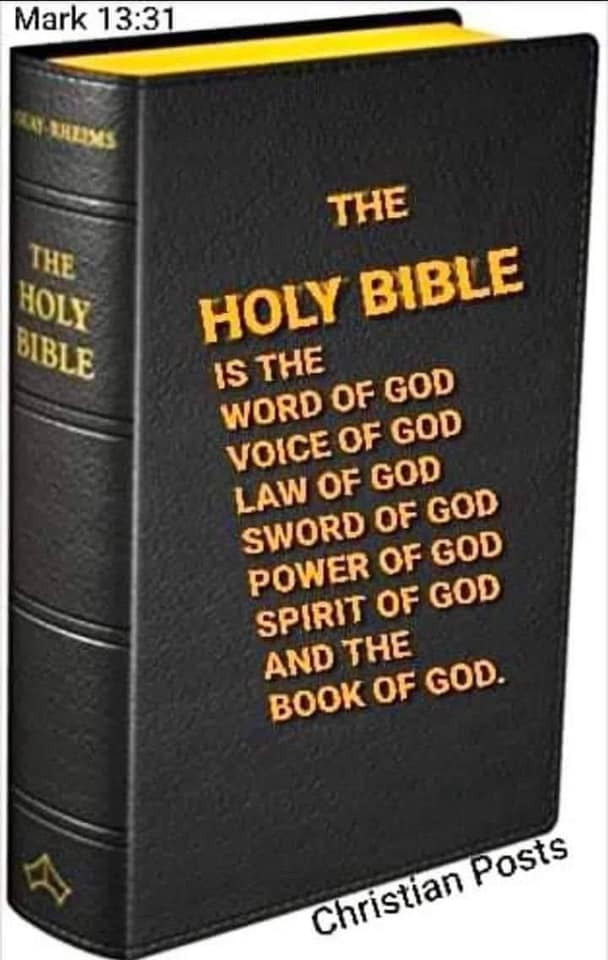
View On WordPress
0 notes
Text
VIDEO ON JUDGMENT WILL BE RENDERED, ARTICLE 1 AUGUST 11, 2021!
There is a time to keep silence, as well as a time to speak; and there are those to whom to offer any thing religious or rational, is to cast pearls before swine. Their silence made Rabshakeh yet more proud and secure. It is often best to leave such persons to rail and blaspheme; a decided expression of abhorrence is the best testimony against them. The matter must be left to the Lord, who has…
youtube
View On WordPress
0 notes
Text
A Demoralizing Attack on Faith | David Guzik [Isaiah 36]
Isaiah 36-37 – Faith Attacked & GOD Glorified
A. Rabshakeh speaks to leaders in King Hezekiah’s
Government.
1. [1-3] Officials from King Hezekiah’s Government
meet Rabshakeh, general of armies of Assyria.
Now it came to pass in 14th year of King Hezekiah
that Sennacherib King of Assyria came up against
all the fortified cities of Judah & took them.
Then the King of Assyria sent the Rabshakeh with
army from Lachish to King Hezekiah at Jerusalem.
He stood by the aqueduct from the upper pool
on the highway to the Fuller’s Field.
And Eliakim the son of Hilkiah, who was over the
household, Shebna the Scribe, & Joah the son of
Asaph, the recorder, came out to him.
a.] In 14th year of King Hezekiah: This was about the
700 B.C., during the reign of godly King Hezekiah
of Judah. The events of this CH are also recorded
in 2 Kings 18:13-27-2 Chronicles 32:1-19.
i.] This begins a four-CH section different than
the prophecies recorded before or after.
Isaiah 36-37 describe the LORD’s work against
the Assyrian threat.
Isaiah 38-39 describe the response to the
Babylonian threat.
ii.] “This is history at its best, not dull recital of
statistics and dates, but an account which
enables us to sense the haughty arrogance
of the Assyrian & chilling clutch of despair
at the hearts of the Israelites.”
[Cundall, cited in Grogan]
b.] Sennacherib King of Assyria came up against all
the fortified cities of Judah and took them: This
Assyrian invasion has been broad background
for much of Isaiah’s prophecy in Isaiah 1-35.
Now, Isaiah gives us a historical record of what
happened during the time he prophesied about.
i.] The Assyrian army swept down from the north,
conquering Syria & Israel, as Isaiah prophesied
in Isaiah 8:3-4 & many other passages.
The Assyrian army then came up against all the
fortified cities of Judah & took them, as Isaiah
prophesied in Isaiah 7:16-17 & many others.
c.] Then the King of Assyria sent the Rabshakeh with
a great army from Lachish to King Hezekiah at Jer
usalem: At the time of Isaiah 36:1-3, the Assyrian
army has conquered both Syria & the northern
Kingdom of Israel & has devastated the country
side & fortified cities of Judah.
.....................................................................................
All that remains is Jerusalem, & if the Assyrians
conquer her, then Judah is destroyed as a nation
just as Syria & Israel were.
.....................................................................................
These were the desperate times of King Hezekiah.
i.] Who was the Rabshakeh?
Actually, it is a title, not a name. It describes the
“field commander” for the Assyrian army, who
represented the Assyrian King Sennacherib.
“Rab-shakeh, Assyrian title, possibly originally
‘chief cup-bearer’ but by this time some high
officer of state.” [Motyer]
ii.] The mention of Lachish is important historically.
Lachish was thirty miles south-west of Jerusalem.
Archaeologists have discovered a pit there with
remains of ~1.5K casualties of Sennacherib’s
attack. In the British Museum, you can see the
Assyrian carving depicting their siege of the city
of Lachish, which was an important fortress city
of Judah.
d. He stood by the aqueduct from the upper pool….
Eliakim…Shebna…Joah…came out to him: Rabshakeh
seems to be in complete command of the situation.
He can walk right into the city of Jerusalem & stand
at crucial water supply, which would be Jerusalem’s
lifeline in a siege attack.
As he stands there, three officials from Hezekiah’s
Government come to meet him.
2. [4-6] Rabshakeh speaks against Judah’s trust in an
alliance with Egypt. Then the Rabshakeh said to
them, “Say now to Hezekiah, ‘Thus says the great
King, the King of Assyria: “What confidence is this
in which you trust? I say you speak of having plans
& power for war; but they are mere words.
......................................................................................
Now in whom do you trust, that you rebel against
me? Look! You are trusting in the staff of a broken
reed, Egypt, on which if a man leans, it will go into
his hand & pierce it.
......................................................................................
So is Pharaoh King of Egypt to all who trust in him.
a.] What confidence is this in which you trust? One of
the great battles for Hezekiah during this time was
the temptation to make a defensive alliance with
Egypt, which seemed to be the only nation strong
enough to protect Judah against the Assyrians.
i.] As a Prophet, Isaiah did everything he could to
discourage Hezekiah & the leaders of Judah
from putting their trust in Egypt
[Isaiah 19:11-17, 20:1-6, 30:1-7]
The LORD wanted Judah to trust HIM instead of
Egypt.
ii.] In this sense, Rabshakeh is speaking the truth!
GOD wanted Judah to have no confidence in
Egypt at all.
.............................................................................................
But Rabshakeh isn’t doing it to bring Judah to a
firm trust in the LORD GOD, WHO can and will
deliver them from the Assyrians.
.............................................................................................
He does it to completely demoralize Judah &
drive them to despair.
iii.] Satan attacks us the same way! Often, even when
he tells the truth [“You are such a rotten sinner!”],
never does it to lead us to a firm trust in YHWH
our GOD [“JESUS died for sinners, so if I am a
rotten sinner, JESUS died to forgive & free me!”]

Instead, Satan’s strategy – even if he tells us the
truth is to demoralize us & drive us to despair.

b.] You are trusting in the staff of this broken reed,
Egypt: Strangely, Rabshakeh could see the truth
of Egypt’s weakness better than many of the
leaders of Judah could.
i.] “Egypt had made its one attempt to redeem its
promises [Isaiah 28:14] and its army had been
beaten at El Tekeh.
The Rab-shakeh had himself seen this, but his
words are more far-reaching and damaging,
exposing criminal stupidity of Judah’s leaders:
Surely, he said, they knew that anyone who
ever trusted Egypt suffered for it.” [Motyer]
3. [7] Rabshakeh speaks against Judah’s trust in GOD.
“But if you say to me, ‘We trust in the LORD our GOD,’
is it not HE WHOSE high places & altars Hezekiah has
taken away, & said to Judah & Jerusalem,
‘You shall worship before this altar’?”’
a.] If you say to me, “We trust in the LORD our GOD”:
Rabshakeh anticipated the response of the leaders
of Judah.
“Rabshakeh, you say that we can’t trust in Egypt.
All right, we won’t. But we can trust in the LORD
our GOD.”
b.] Is it not HE WHOSE high places & WHOSE altars
Hezekiah has taken away? Rabshakeh knew that
King Hezekiah had implemented broad reforms
in Judah, including removal of the high places
[2 Kings 18:3-4].
i.] High places were spots of “individual worship”
which were prohibited by GOD’s law
[Leviticus 17:1-4].
Israel was commanded to bring their sacrifices
to the official center for sacrifice [tabernacle
or later, the Temple].
In pagan world at that time, it was customary
to offer sacrifice wherever one pleased –
altars would customarily be built on high hills,
in forested areas, or at other special places.
ii.] That practice may have been fine for the time
of the patriarchs. But now, GOD regarded sacr
-ifice at high places as an offense.
Hezekiah did right when he took away the high
places & the altars, demanding people come to
the Temple in Jerusalem to offer sacrifice.
iii.] This command runs completely contrary to the
way most people come to GOD in our culture.
For the most part, Americans have an entirely
individualistic way of coming to GOD, where
each person makes up their own rules about
dealing with GOD as they see HIM.
In the book Habits of the Heart, Robert Bellah &
his colleagues interview a young nurse named
Sheila Larson, whom they describe as represent
many Americans’ experience & views on religion.
Speaking about her own faith & how it operates
in her life, she says: “I believe in GOD. I’m not a
religious fanatic. I can’t remember the last time
I went to Church. My faith has carried me a long
way. It is ‘Sheilaism.’ Just my own little voice.”
.............................................................................................
This “pick-and-choose-as-I-go-along-according-
to-my-inner-voice” approach is just like picking
your own high place & altar to sacrifice to GOD
the way you want to instead of the way GOD
wants you to.
.............................................................................................
c.] Is it not HE WHOSE high places & altars Hezekiah has
taken away? In Rabshakeh’s thinking, Hezekiah’s re-
forms have really displeased GOD, so he should not
expect help from the LORD GOD of Israel.
Rabshakeh would say, “Look at all the places there
used to be where people would worship the LORD
GOD of Israel. [DEMONIC LOGIC]
Now, since Hezekiah came in, there is only one place.
More is always better, so the LORD GOD
of Israel must be pretty sore at Hezekiah!”
i.] Enemy of our souls has an amazing way of discour-
aging our obedience. If Hezekiah was not careful,
this argument of Rabshakeh would start to make
sense, when really it was demonic logic through
& through.
ii.] “The theological misunderstanding shown by the
field commander at this point argues for the auth
enticity of the speech, which many critics have
dubbed a free creation by author of narrative.”
[Grogan]

4. [8-9] Rabshakeh speaks against the army of Judah.
Now therefore, I urge you, give a pledge to my
master the King of Assyria, & I will give you 2K
horses—if you're able on your part to put riders
on them! How then will you repel one captain of
the least of my master’s servants, and put your
trust in Egypt for chariots & horsemen?

a.] Give a pledge to my master the King of Assyria:
This reminds us of Rabshakeh’s whole strategy,
which is to make Judah give up.
This is the entire reason Rabshakeh is at the
aqueduct, speaking to leaders of Hezekiah’s
Government.
He had the vastly superior armies; he could have
just attacked Jerusalem without this little speech.
But Rabshakeh would prefer it if Judah would give
up, out of fear, discouragement, or despair.
i.] The enemy of our soul uses the exact same
approach. Many of us picture Satan as
“itching for a fight” with us.
Really, Satan doesn’t want to do battle with you.
[1] There is the strong chance you'll win.
[2] Win or lose, the battle can
draw you closer to the LORD.
[3] What the LORD does in your life through
the battle can be a great blessing for others.

No, Satan would much rather not fight you at all!
He'd much rather try to talk you into giving up.

ii.] We see this exact strategy used against JESUS
during HIS temptation in the wilderness.
When Satan promised JESUS all the Kingdoms of
the world in exchange for JESUS’ worship, Satan
was trying to avoid the fight, and trying to talk
JESUS into giving up [Luke 4:5-8]
It didn’t work with JESUS, & shouldn’t work on us.
b.] I will give you two thousand horses–if you are able
on your part to put riders on them: Here, Rabshakeh
mocked Judah’s weak army.
He said, “Even if we helped you with 2,000 horses,
it wouldn’t do you any good.” His basic Message is,

“We could beat you with one hand tied behind our
backs!” [How then will you repel one captain of the
least of my master’s servants].


5. [10] Rabshakeh tells them that the LORD GOD of
Israel is on his side. Have I now come up without
the LORD against this land to destroy it? YHWH
said, ‘Go up against this land, & destroy it.’”

a.] Have I now come up without the LORD against
this land to destroy it? Rabshakeh saved his best
thrust for last: “Admit it, Hezekiah.
You know that your GOD is on my side.”
i.] Like all good deception, it would have been
easy for Hezekiah & men to believe this one.
After all, hadn’t the Assyrians been wildly
successful? Surely, GOD must be on their side.
Didn’t they have the most powerful army?
Surely, GOD must be on their side.
b.] The LORD said to me, “Go up against this land, &
destroy it”: This was the finishing blow of a brill
-iant attack.
“Hezekiah, GOD told me to destroy you. I’m just
doing HIS will, & there is nothing you can do to
stop it, so you may as well surrender.”
i.] Significantly, we can say that Rabshakeh was
partially correct! GOD was with him, and his
attack on Judah fulfilled GOD’s prophesied
plan! In conquering Syria, in conquering
Israel, & in bringing Judah to the brink, the
Assyrians did the will of GOD!
GOD prophesied that all this would happen
[Isaiah 8:3-4, 7:16-17 & many other passages]
HE allowed it to happen so HIS prophesied
plan would be fulfilled.
...........................................................................................
ii.] However, we should never think that GOD
tempted an innocent man with an evil plan.
...........................................................................................
In fact, even tho GOD predicted & planned
this invasion of the Assyrians, Rabshakeh
may have been lying indeed when he said,
“The LORD said to me.” GOD did not have to
do anything special to direct a bloodthirsty,
conquest-hungry Assyrians to attack Syria
Israel, & Judah.
...........................................................................................
HE simply allowed the Assyrians to carry out
the corrupt desires of their evil hearts.
...........................................................................................
Therefore, the Assyrians could never excuse
themselves by saying, “We were doing the
LORD’s will!” even as Judas could never make
that excuse regarding his wicked betrayal of
JESUS.
youtube

Isaiah 36:1-10 | Sennacherib Threatens Jerusalem
[2 Kings 18:13-37; 2 Chronicles 32:1-8]

¹ In the 14th year of Hezekiah’s reign, Sennacherib
King of Assyria attacked & captured all the fortified
cities of Judah.
² And the King of Assyria sent the Rabshakeh, with
a great army, from Lachish to King Hezekiah at
Jerusalem. And he stopped by the aqueduct of the
upper pool, on the road to the Launderer’s Field.
³ Then Eliakim son of Hilkiah the Palace Administrator,
Shebna the scribe, & Joah son of Asaph the Recorder,
went out to him. ⁴ The Rabshakeh said to them,
“Tell Hezekiah that this is what the great King, the
King of Assyria, says: What is the basis of this
confidence of yours?
⁵ You claim to have a strategy & strength for war,
but these are empty words. On whom are you
now relying, that you have rebelled against me?
⁶ Look now, you are trusting in Egypt, that
splintered reed of a staff that will pierce
the hand of anyone who leans on it.
Such is Pharaoh King of Egypt to all who
trust in him.
⁷ But if you say to me, ‘We trust in the LORD our GOD,’
is HE not the ONE WHOSE high places and altars
Hezekiah has removed, saying to Judah & Jerusalem
‘You must worship before this altar’?
⁸ Now therefore, make a bargain with my master,
the King of Assyria. I will give you two thousand
horses—if you can put riders on them!
⁹ For how can you repel a single officer among the
weakest of my master’s servants when you
depend on Egypt for chariots & horsemen?
¹⁰ So now, was it apart from the LORD that I have
come up against this land to destroy it? The
LORD HIMSELF said to me, ‘Go up against this
land & destroy it.’”
#Isaiah 36#Isaiah#2aiii#devil uses truth to demoralize us#drive us to despair#not firm hope#counterfeit gods#3ci#demonic logic#discourage obedience
0 notes
Text
Charles Spurgeon's "Faith's Checkbook" Devotional: April 29th
“Forget and Forgive ”
Proverbs 20:22
Be not in haste. Let anger cool down. Say nothing and do nothing to avenge yourself. You will be sure to act unwisely if you take up the cudgels and fight your own battles; and, certainly, you will not show the spirit of the LORD Jesus, It is nobler to forgive and let the offense pass. To let an injury rankle in your bosom and to meditate revenge is to keep old wounds open and to make new ones. Better forget and forgive.
Peradventure, you say that you must do something or be a great loser; then do what this morning’s promise advises: "Wait on the LORD, and he shall save thee." This advice will not cost you money but is worth far more, Be calm and quiet. Wait upon the LORD; tell Him your grievance; spread Rabshakeh’s letter before the LORD, and this of itself will be an ease to your burdened mind. Besides, there is the promise "He shall save thee." God will find a way of deliverance for you. How He will do it neither you nor I can guess, but do it He will, If the LORD saves you, this will be a deal better than getting into petty quarrels and covering yourself with filth by wrestling with the unclean, Be no more angry. Leave your suit with the Judge of all.
Copyright Statement
These files are public domain.
0 notes
Text
Then the Rabshakeh stood and called out in a loud voice in the language of Judah, "Hear the word of the great king, the king of Assyria! Thus says the king: 'Do not let Hezekiah deceive you, for he will not be able to deliver you out of my hand. Do not let Hezekiah make you rely on the LORD by saying, The LORD will surely deliver us.'"
~2 Kings 18:28-30
1 note
·
View note
Text
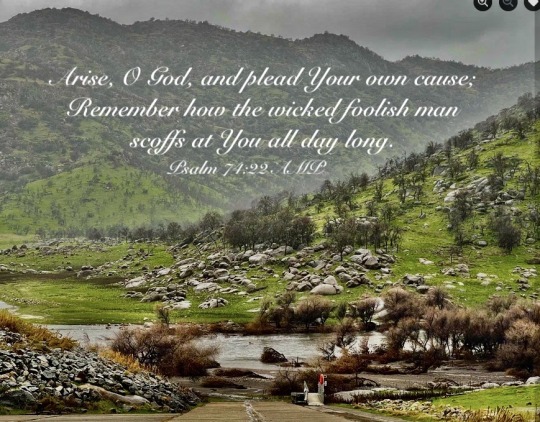
See The Power
“…Hezekiah received the letter from the hand of the messengers and read it. And Hezekiah went up to the house of the Lord and spread it before the Lord. …Hezekiah prayed to the Lord: “O Lord of hosts, God of Israel, …You are the God, You alone, of all the kingdoms of the earth. You have made heaven and earth. Incline Your ear, O Lord, and hear; open Your eyes, O Lord, and see; and hear all the words of Sennacherib which he has sent to mock, reproach, insult, and defy the living God. It is true, Lord, that the kings of Assyria have laid waste all the nations and their lands. And have cast the gods of those peoples into the fire, for they were not gods but the work of men’s hands, wood and stone. Therefore they have destroyed them. Now therefore, O Lord our God, save us from his hand, that all the kingdoms of the earth may know (understand and realize) that You are the Lord, even You only.” Isaiah 37:14-20AMPC.
Go back and read Isaiah 36-37:16. You will see how Rabshakeh, the leading general of Assyria’s army, blasphemed Yahweh and reviled the Jewish people. To make matters worse, Sennacherib, Assyria’s king added insult to the injury made by his general, he directly blasphemed Yahweh himself. Then read what Yahweh-God’s response was reading through the rest of the chapter37.
More powerful than the atomic bomb, greater than all imagination is the power of Yahweh-Lord over all. His answer to Hezekiah’s prayer was— “And the Angel of the Lord went forth, and slew 185,000 in the camp of the Assyrians…” ONE ANGEL people, only one. Do you see the power of Hezekiah’s prayer? One prayer! Read the last two verses of chapter 37 aloud, for the import of God’s response personally regarding the king. His own sons murdered him.
Is it possible what is going on in our nation is blaspheming God? Can the statements made by members of the Senate, some Congressional members, and the acting President be borderline blasphemy, if not pure blasphemy? Perhaps some of the rich, elitists are speaking blasphemies about Yahweh. Maybe the walls of their homes cry out to God for purging of the blasphemies spoken against Him and Holy Spirit within them.
These various people groups, plus the Cabal, Free Mansons. (who are about the most enslaved people alive), One World government and Pope could be the equal to the enemy Assyrian army against Hezekiah.
Will you join in with me to pray Hezekiah’s prayer against our enemy forces as we look to the Woke agenda, the CRT, agenda, and the Communism plaguing our nation? I’m not going to pray once and done. No, I’m going to make it a multi-time a day prayer. They’re out to destroy our nation. I say— Let’s destroy them with God’s power. Are you with me? It’s your choice. You choose.
LET’S PRAY: Yahweh Lord over all, I lift up Hezekiah’s prayer over our nation, in the name of Jesus Christ. As one covered in the blood of Jesus, my petition before You Lord is as one of Your children declaring the enemy is blaspheming You having no right to speak. Will You allow this to stand in the court of heaven. Or will You render judgment? Answer our prayer, we pray, in the name of Jesus Christ.
by Debbie Veilleux
Copyright 2023 You have my permission to reblog this devotional for other. Please keep my name with this devotional, as author. Thank you.
#Jesus Christ#lord of lords#word of god#Holy Spirit#God#it's your choice#devotional#power#see#prayer#atomic#destroy#enslaved#blasphemy#members#rich#elitist#love#hope#faith
0 notes